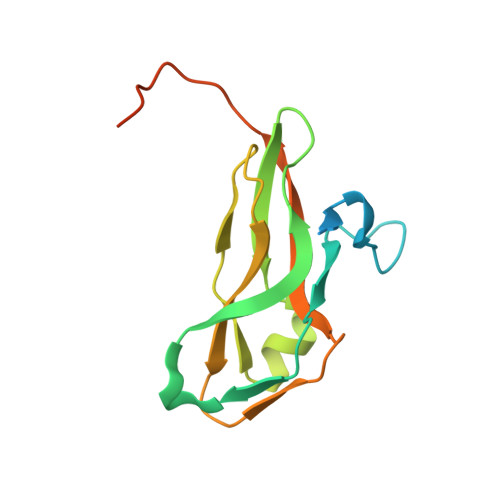Flexible segments modulate co-folding of dUTPase and nucleocapsid proteins.
Nemeth-Pongracz, V., Barabas, O., Fuxreiter, M., Simon, I., Pichova, I., Rumlova, M., Zabranska, H., Svergun, D., Petoukhov, M., Harmat, V., Klement, E., Hunyadi-Gulyas, E., Medzihradszky, K.F., Konya, E., Vertessy, B.G.(2007) Nucleic Acids Res 35: 495-505
- PubMed: 17169987
- DOI: https://doi.org/10.1093/nar/gkl1074
- Primary Citation of Related Structures:
2D4L, 2D4M, 2D4N - PubMed Abstract:
The homotrimeric fusion protein nucleocapsid (NC)-dUTPase combines domains that participate in RNA/DNA folding, reverse transcription, and DNA repair in Mason-Pfizer monkey betaretrovirus infected cells. The structural organization of the fusion protein remained obscured by the N- and C-terminal flexible segments of dUTPase and the linker region connecting the two domains that are invisible in electron density maps. Small-angle X-ray scattering reveals that upon oligonucleotide binding the NC domains adopt the trimeric symmetry of dUTPase. High-resolution X-ray structures together with molecular modeling indicate that fusion with NC domains dramatically alters the conformation of the flexible C-terminus by perturbing the orientation of a critical beta-strand. Consequently, the C-terminal segment is capable of double backing upon the active site of its own monomer and stabilized by non-covalent interactions formed with the N-terminal segment. This co-folding of the dUTPase terminal segments, not observable in other homologous enzymes, is due to the presence of the fused NC domain. Structural and genomic advantages of fusing the NC domain to a shortened dUTPase in betaretroviruses and the possible physiological consequences are envisaged.
Organizational Affiliation:
Institute of Enzymology, BRC, Hungarian Academy of Sciences, Budapest, Karolina út 29, H-1113, Hungary.

















